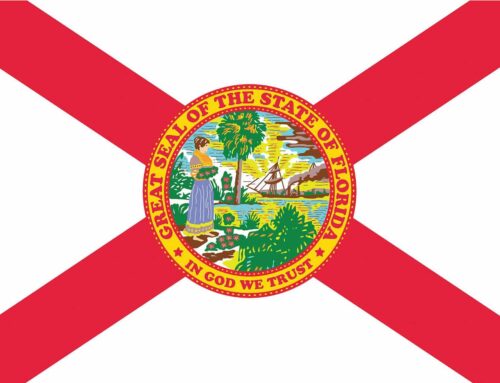Are you planning on moving out of state with an SR22 Insurance requirement on your license?
You need to do it right. Screwing that up can cost you a lot of money, time, and hassle. It can get your license suspended again – and it can even land you in jail.
Let’s get the important stuff out of the way, first: If you have an SR22 requirement in one state, that doesn’t go away when you move to a new state!
You will need to get your car insurance company to transmit an SR22 document to the Department of Motor Vehicles in your new state. The SR22 requirement still applies even if you’re moving to a state that doesn’t have an SR22 requirement of its own.
What’s an SR22?
The SR in SR22 stands for “statement of responsibility.” All it is is an affidavit that your car insurance company files with your state’s Department of Motor Vehicles verifying that you carry the state minimum required liability insurance amount.
All but a handful of states require drivers who are convicted of a DUI, DWI, reckless driving, driving without insurance, or who have too many moving violations, to have their insurance companies transmit an SR22 to the state motor vehicle bureau. It’s normally a condition of getting a suspended license reinstated. If you let your insurance coverage lapse, the carrier will inform the state, and they’ll automatically suspend your license again. You won’t be permitted to drive again until you get insurance back in force, and your insurance company verifies it by sending in a new SR22 form.
What happens if my SR22 lapses when I’m moving?
If you let your SR22 laps, your insurer will automatically notify your state DMV by transmitting an SR26 form. When your state DMV receives that, they’ll automatically suspend your license.
They’ll also notify every other state.
So when you move to your new state, the new DMV will have a flag on your file, and they will block you from getting a new license, or even from registering your vehicle.
Depending on your state, there could be additional penalties for letting your SR 22 insurance lapse.
Also, just the fact that you let your insurance lapsed could make it more difficult for you to buy car insurance in the future. You may have to pay a higher premium.
Car insurance companies regard people with recent car insurance lapses as higher risk. Some may decline your application. Most will charge a higher premium to people who recently let their car insurance lapse, even without an SR22 and whatever other dings you have on your drivers’ record.
Your best bet: Don’t let your insurance lapse. Especially when you have an SR22 requirement. That will just cause a cascading series of problems for you.
If you’re having trouble paying for car insurance and you don’t know what to do, give us a call! It may well be you’re paying way too much for your current SR 22 insurance. Some carriers don’t treat SR22 drivers fairly and jack up their premiums beyond reason.
The best way to keep them honest is to get quotes from several different carriers every so often
Especially when you have an SR22 requirement!
How to move your SR22 to a new state
In most cases, you’ll need to maintain an SR22 filing in your old state even after you’ve moved to a new state. Typically, a first offender will have to keep his or her SR22 filing in effect for three years from the date of the offense. So before you move, you need to line up insurance in the state you’re moving to.
Your current carrier may be able to simply transfer your policy to the new state, and just retransmit the SR22. Don’t cancel your existing SR 22 insurance in your old state until after you have your new insurance in force and and SR22 filed in your new state. Actually, it’s a good idea to let them overlap by a week or so, just to make sure.
If your new state requires more liability insurance than your old state, you’ll need to purchase the additional coverage. If your new state has lower insurance requirements than your old state, you may need to keep the higher limits in force for the remainder of your SR 22 insurance requirement.
Don’t worry. You need the additional coverage. The state minimum insurance requirements are all far too low to provide adequate protection either for you or for the other drivers and pedestrians on the road with you. Your carrier will keep the SR22 on file in your old state, and only notify them of your
In many cases, your current insurance carrier won’t be able to transfer your SR22 to a new state.
You’ll need to switch companies. If you switch, your new carrier will need to file an SR22 form with both states. That is, they’ll need to do a cross-state SR22 filing with both your old state and your new state. That means your agent needs to be licensed in both states.
If you move to one of the eight states that doesn’t have an SR22 requirement, they’ll still require you to affirm in writing that you’re keeping your SR22 current in your old state. So you can’t escape the requirement by moving out if state.
As of late 2022, the states that don’t have an SR22 requirement are:
- Delaware
- Kentucky
- Minnesota
- New Mexico
- New York
- North Carolina
- Oklahoma
- Pennsylvania
Whatever the case, you should shop around multiple insurance companies before signing on with one. SR 22 insurance is a specialized market, and pricing varies radically between companies:
Some carriers don’t want high-risk or SR22 drivers on their books at all. Other carriers compete aggressively for certain high-risk drivers.
Your pricing can also vary due to the kind of car you drive, your credit history, your age, marital status, education, occupation/profession, and whether you own a home or rent.
Special Note for Florida and Virginia Residents
Florida and Virginia are unusual in that they have an FR44 requirement, not an SR22. They are very similar, except that the FR44 requirement means you have to buy extra liability insurance to keep your license in force.
So when a Florida or Virginia resident moves out of state, they usually ask us what they have to do to get their FR44 transferred to a new state.
Unfortunately, you can’t. You’ll need to keep your FR44 insurance current in Florida or Virginia until your requirement expires – typically three years after your offense, for first offenders.
You can, however, buy a new standard (non-SR22) policy in your new state. But your drivers’ record will probably follow you to your new state. So you may wind up having to pay for two separate car insurance policies because of your FR44.
Again, don’t let your coverage lapse!
If that happens, your state will notify National Driver Register (NDR) database. They’ll suspend your license, all other states will block you from getting a new driver’s license.
SR22 Insurance When You Don’t Own A Car
If you get an SR22 requirement, you must buy insurance and keep a current SR22 on file with your state’s Department of Motor Vehicles – even if you don’t own a car.
The state isn’t dumb. They know that if you got caught driving under the influence, reckless driving, or racking up too many points on your license, you’re not likely to stop driving just because you don’t own a car. They know you’ll soon buy one, rent one, or borrow own, or you’ll be driving for your job.
So you need to satisfy that lingering SR22 requirement until your 3-year or 5-year SR22 requirement expires. Even though you don’t own a car of your own.
The good news is, you can legally satisfy the requirement by buying a “non-owner” car insurance policy and having the carrier transmit an SR22 on your behalf.
While standard car insurance policies follow the car, not the driver, a non-owner policy follows you, and covers you no matter what car you drive.
Non-owner policies are liability only. They won’t pay if you damage the car you’re driving. But they’ll still provide protection for injuries or damage you cause for other drivers while you drive a rented or borrowed car.
When you do buy a car, you’ll need to buy insurance for the car.
But until then, a non-owner car insurance policy can be had for much less than standard car insurance policy costs for car owners.
Use an independent broker, not a captive agent.
Many insurance agents are “captive.” They aren’t permitted to show you any policies from insurance companies other than that agent’s employer. Ultimately, the captive agent works for the insurance company. Not for you, the customer.
Insurance policies from these captive agents are rarely competitively priced – especially in the high-risk/SR 22 insurance market. In fact, the assumption with these carriers is that you won’t be shopping around at all. And so they don’t bother with discounting their pricing.
When you work with Select Insurance Group, an independent insurance broker, it’s a totally different deal: We work for you, the customer! Not the insurance company. With us, we take your application to as many as a dozen different insurance companies, depending on your state. All of them competing aggressively for your business.
Yes, your insurance premiums will be higher than they would have been if you had a perfect driving record. That’s just the reality in the higher-risk insurance world.
That doesn’t mean you need to lie down and take it when a captive car insurance company wants to jack up your rates beyond all reason because you made a mistake. And you don’t need stand for being treated poorly because you have an SR 22 insurance requirement.
At Select Insurance Group, we built the whole agency around customers just like you.
So you can be confident you’re getting a good value on your car insurance.
SR 22 insurance isn’t cheap! But when you get quotes from several different insurance companies with one inquiry and you can pick the best one, you’ll know that you’re not being unfairly taken advantage of.
Work with an experienced SR 22 insurance expert.
SR 22 insurance isn’t a job for rookie agents or generalists. Especially when there are interstate issues involved. It’s too easy for inexperienced insurance agents to drop the ball and get this wrong.
But if your agent doesn’t know the ins and outs of SR 22 insurance in multiple states, you could wind up accidentally lapsing. Not only does that get your drivers’ license suspended, but it can set off a devastating chain reaction: You could get arrested and do jail time for driving without a license.
You could lose your job because you can’t get to work. The state may “reset the clock” so your three-year SR22 requirement starts again at zero. That means you’ll be paying higher car insurance premiums that much longer! That alone could cost thousands of dollars over the next three years – all because your rookie car insurance agent who’s not used to dealing with this specialized market messed up!
It’s worth a few extra dollars a month to work with an experienced car insurance professional who specializes in SR 22 insurance, with a brokerage that’s a nationally-recognized leader in SR22 and other non-standard risk car insurance.
If you’ve got an SR22 requirement and planning to move out of state – or you are just lost because you recently got a DUI or reckless driving arrest and don’t know what to do, here’s what to do:
Drop us a line, and fill out this brief online form describing your situation.
Or you can skip the online stuff, and give us a call directly!
See you on the road!
Steve “Mr. Insurance” Ludwig
CEO, Select Insurance Group
For Further Reading
Bad Credit Car Insurance – How to Find It, and How To Fix It
Is Comprehensive Car Insurance Worth It?
Can I Drive for Uber and Lyft After a DUI






